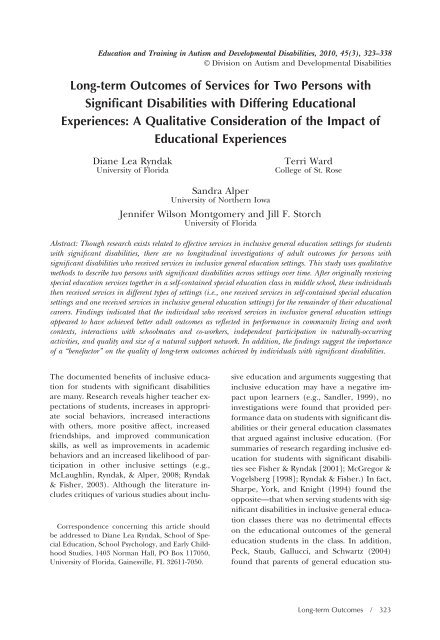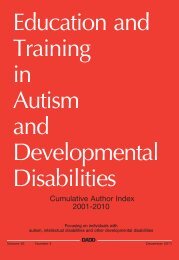Education and Training in Autism and Developmental Disabilities
Education and Training in Autism and Developmental Disabilities
Education and Training in Autism and Developmental Disabilities
You also want an ePaper? Increase the reach of your titles
YUMPU automatically turns print PDFs into web optimized ePapers that Google loves.
<strong>Education</strong> <strong>and</strong> <strong>Tra<strong>in</strong><strong>in</strong>g</strong> <strong>in</strong> <strong>Autism</strong> <strong>and</strong> <strong>Developmental</strong> <strong>Disabilities</strong>, 2010, 45(3), 323–338<br />
© Division on <strong>Autism</strong> <strong>and</strong> <strong>Developmental</strong> <strong>Disabilities</strong><br />
Long-term Outcomes of Services for Two Persons with<br />
Significant <strong>Disabilities</strong> with Differ<strong>in</strong>g <strong>Education</strong>al<br />
Experiences: A Qualitative Consideration of the Impact of<br />
<strong>Education</strong>al Experiences<br />
Diane Lea Ryndak<br />
University of Florida<br />
S<strong>and</strong>ra Alper<br />
University of Northern Iowa<br />
Terri Ward<br />
College of St. Rose<br />
Jennifer Wilson Montgomery <strong>and</strong> Jill F. Storch<br />
University of Florida<br />
Abstract: Though research exists related to effective services <strong>in</strong> <strong>in</strong>clusive general education sett<strong>in</strong>gs for students<br />
with significant disabilities, there are no longitud<strong>in</strong>al <strong>in</strong>vestigations of adult outcomes for persons with<br />
significant disabilities who received services <strong>in</strong> <strong>in</strong>clusive general education sett<strong>in</strong>gs. This study uses qualitative<br />
methods to describe two persons with significant disabilities across sett<strong>in</strong>gs over time. After orig<strong>in</strong>ally receiv<strong>in</strong>g<br />
special education services together <strong>in</strong> a self-conta<strong>in</strong>ed special education class <strong>in</strong> middle school, these <strong>in</strong>dividuals<br />
then received services <strong>in</strong> different types of sett<strong>in</strong>gs (i.e., one received services <strong>in</strong> self-conta<strong>in</strong>ed special education<br />
sett<strong>in</strong>gs <strong>and</strong> one received services <strong>in</strong> <strong>in</strong>clusive general education sett<strong>in</strong>gs) for the rema<strong>in</strong>der of their educational<br />
careers. F<strong>in</strong>d<strong>in</strong>gs <strong>in</strong>dicated that the <strong>in</strong>dividual who received services <strong>in</strong> <strong>in</strong>clusive general education sett<strong>in</strong>gs<br />
appeared to have achieved better adult outcomes as reflected <strong>in</strong> performance <strong>in</strong> community liv<strong>in</strong>g <strong>and</strong> work<br />
contexts, <strong>in</strong>teractions with schoolmates <strong>and</strong> co-workers, <strong>in</strong>dependent participation <strong>in</strong> naturally-occurr<strong>in</strong>g<br />
activities, <strong>and</strong> quality <strong>and</strong> size of a natural support network. In addition, the f<strong>in</strong>d<strong>in</strong>gs suggest the importance<br />
of a “benefactor” on the quality of long-term outcomes achieved by <strong>in</strong>dividuals with significant disabilities.<br />
The documented benefits of <strong>in</strong>clusive education<br />
for students with significant disabilities<br />
are many. Research reveals higher teacher expectations<br />
of students, <strong>in</strong>creases <strong>in</strong> appropriate<br />
social behaviors, <strong>in</strong>creased <strong>in</strong>teractions<br />
with others, more positive affect, <strong>in</strong>creased<br />
friendships, <strong>and</strong> improved communication<br />
skills, as well as improvements <strong>in</strong> academic<br />
behaviors <strong>and</strong> an <strong>in</strong>creased likelihood of participation<br />
<strong>in</strong> other <strong>in</strong>clusive sett<strong>in</strong>gs (e.g.,<br />
McLaughl<strong>in</strong>, Ryndak, & Alper, 2008; Ryndak<br />
& Fisher, 2003). Although the literature <strong>in</strong>cludes<br />
critiques of various studies about <strong>in</strong>clu-<br />
Correspondence concern<strong>in</strong>g this article should<br />
be addressed to Diane Lea Ryndak, School of Special<br />
<strong>Education</strong>, School Psychology, <strong>and</strong> Early Childhood<br />
Studies, 1403 Norman Hall, PO Box 117050,<br />
University of Florida, Ga<strong>in</strong>esville, FL 32611-7050.<br />
sive education <strong>and</strong> arguments suggest<strong>in</strong>g that<br />
<strong>in</strong>clusive education may have a negative impact<br />
upon learners (e.g., S<strong>and</strong>ler, 1999), no<br />
<strong>in</strong>vestigations were found that provided performance<br />
data on students with significant disabilities<br />
or their general education classmates<br />
that argued aga<strong>in</strong>st <strong>in</strong>clusive education. (For<br />
summaries of research regard<strong>in</strong>g <strong>in</strong>clusive education<br />
for students with significant disabilities<br />
see Fisher & Ryndak [2001]; McGregor &<br />
Vogelsberg [1998]; Ryndak & Fisher.) In fact,<br />
Sharpe, York, <strong>and</strong> Knight (1994) found the<br />
opposite—that when serv<strong>in</strong>g students with significant<br />
disabilities <strong>in</strong> <strong>in</strong>clusive general education<br />
classes there was no detrimental effects<br />
on the educational outcomes of the general<br />
education students <strong>in</strong> the class. In addition,<br />
Peck, Staub, Gallucci, <strong>and</strong> Schwartz (2004)<br />
found that parents of general education stu-<br />
Long-term Outcomes / 323

















